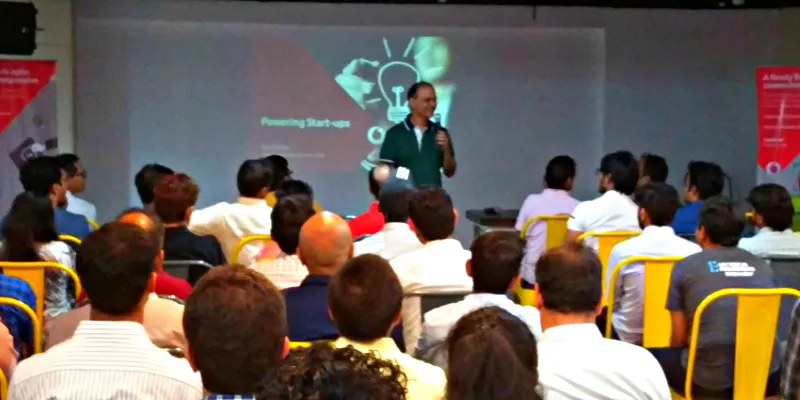Vodafone looks to partner with startups through all stages of their life cycle
In line with its agenda to become a valued stakeholder in India's startup ecosystem, network giant Vodafone has announced scores of initiatives for SMEs in order to establish itself as a “startup friendly partner” for collaborations, even as it develops disruptive offerings in its own laboratories to add more value to its customer experience.

“We at Vodafone also carry the mindset of a startup. We went through the same struggles. But we also want to prove that we can be important stakeholders in the startup ecosystem. We want to connect with startups, pick up any idea that is relevant to us, and take it to our customers. We connect with users right at the village level, and our network will be invaluable to a startup,” said Ajay Sehgal, SVP – SME Business, Vodafone Business Services, at an event jointly organised by YourStory and Vodafone, to facilitate Vodafone's entry into the ecosystem.
From prototype to product to scale
During a panel discussion on challenges that startups typically grapple with in their early stages, Pratyush Jalan, Founder, BoxMySpace, opined that if one's goals aren't laughable, they're not good enough. “When I started out, my vision was to have offices in three cities. Well, I achieved that, and then, there was a stalemate. I didn't know what next. So, whatever dream you have, you must think big,” he explained.
Adding to this thought, Sandeep Mittal, MD, Cartesian Consulting, said that the greatest impediment to your success is you, yourself. "If you think small, you will sell yourself short, and not believe in yourself enough to charge your clients enough," he said.
Thinking big, however, is easier said than done. Startups tend to make some cardinal errors, like adopting flawed market research, while aiming for scale. “Investors are always interested in the scalability of any concept. But startups often fail to take into account India's diversity, and fail to understand that products that may work in South India may fail to appeal to North Indian audiences,” said Nidhi Saraf, Head - West & East India Operations, Indian Angel Network, by way of an example.
Thus, at the prototyping stage, one must go as lean as possible, and, according to Pratyush, one does not need to build the actual product.
"In fact, just use screenshots of the product. Survey your target audience based on that, and build based on those responses. Have a mixed focus group of people you know and don’t know to get all sorts of perspective on board," said Kartik Poddar, Co-founder at Fropcorn.
"Make sure your survey is not filled with questions that just have the answers that you want to hear. And, lastly, do not get emotionally attached to your prototype,” added Ajay.
Partnership woes
Ajay said that one cannot build every skillset one needs to run their company with. “You must collaborate and partner. And look for partners who can bring agility to your team,” he said.
Having said that, Kartik cautioned that large corporates are difficult to partner with. “There are two things you must keep in mind. They all suffer from ‘FOMO’ (fear of missing out). So you must make them feel like they are a part of the startup surge, and make them feel accountable. And secondly, always let them know that you are also at advanced stages of discussion with their competitors. It works like a charm,” he joked.
One must also remember that each problem in each area of operation will multiply when the startup scales. “You will go from working for your startup to managing your company. You have to remember to enjoy the process,” said Sandeep.
At the event, Vodafone expressed its wish to participate in community forums to build visibility, and establish itself as a 'startup-friendly partner.' “We want to launch programmes to position ourselves as a startup-friendly partner, offer experience packs, and help develop solutions on our platform. To that effect, we look forward to partnering with leading industry players and incubators,” Ajay said, in conclusion.







